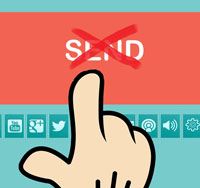Feeling emotional? Don’t hit send!

It’s 11pm and your phone beeps. Against your better judgment you pick it up and see it’s a client email. Soon you’re sucked into a missive about the latest calamity in your client’s life, the client’s anxiety about the case, and what you will do about everything. You sense your own anger and frustration rise as you think about how to respond.
It is tempting and easy to hit the send button and fire off an emotional email in the heat of the moment. Taken over by a “fight or flight” response, it is a natural and human instinct to want to do something immediately. Every pore of your being might scream to be heard. Adding fuel to the fire, you know your client wants an immediate response. In this age of instant text messages and 24/7 availability, you feel obligated to reply right away. But pause and take stock.
Will your client be best served by a late night reply? Are you making good decisions at that time? An angry email to a client can set off a chain of events and negative emotions leading to a lost client, or worse, a claim. Even a neutral-sounding email, sent at the wrong time, can be misinterpreted. Nobody sees your face or hears your tone of voice when you email – the ambiguity can make matters worse.
More often than not, communicating difficult issues with your client is often best done face to face. Have a frank conversation over a coffee. In lieu of an in-person meeting, a phone call is also a good alternative as the tone of voice can come through.
If you absolutely must vent, one tip is to type out everything you want to say in a document. If you type it in an email, don’t write in the address and risk accidentally pressing send. Alternatively, type it in a Word document. Then review it the next day and consider changing it or discarding it. Some malpractice claims contain emails with disparaging remarks about the client. This leaves a bad impression on the lawyer and does not help.
Communication-related errors are the #1 source of malpractice claims. Allegations of negligence may arise if a client perceives the lawyer negatively when the lawyer doesn’t listen, doesn’t share information, speaks jargon, doesn’t care, or has no sense of time. All of these can come out in a poorly written and badly timed email.
Invest time in your client with instant and direct two-way communication over the phone or in person. The positive experience can cause client loyalty and help build a relationship of trust and respect. In a face-to-face conversation your client is more likely to discuss all the issues, increasing the likelihood of patching up any problems, and decreasing the likelihood of miscommunication.

Leave a Reply